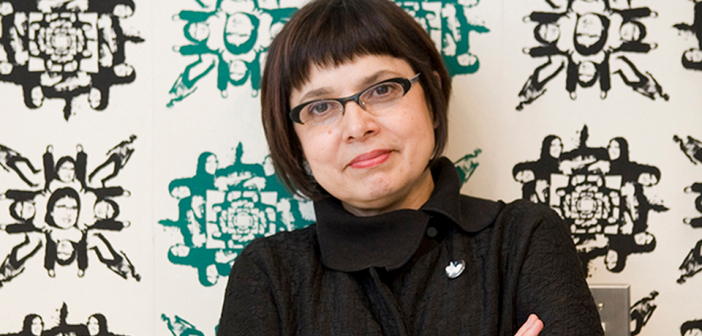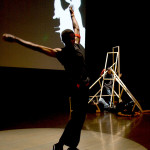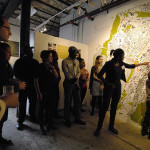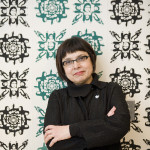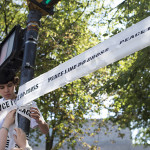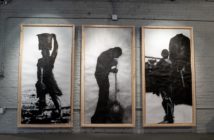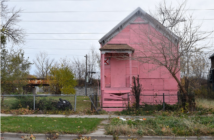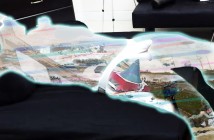Tell us about The Urbano Project. What's its mission and focus, how does it differ from other organizations of its kind, and how does it operate?
The mission of Urbano is to bring together urban teens and professional artists to create social change through participatory works of contemporary art. We hope to nurture a new generation of artists, leaders, and human beings. We are distinct from other organizations because we are really looking at the forefront of artistic practice and educational practice. We are also looking at what it means to be a creative individual living in this day and age. We're not interested just in technique or craft in art education, or showing them one thing or another. With our teens and practicing artists, we are exploring together and working together to see how we can change our social and physical environment, to be engaged in our lives in a passionate way, doing things that we care about in ways that are really meaningful to us and to our communities and the world.
I have been researching and thinking about pedagogy as art. Here’s a quote from Felix Guattari: "How can you bring a classroom to life as though it were an artwork?" That's what we want to do here at Urbano.
Tell us why and how you established The Urbano Project. What did you do before, and how did that work equip you for the work you do now?
When I came back to the states and to Boston in the mid-1980s, I founded the Space, an alternative artist-run space for contemporary art, close to the Ruggles station in the pre-gentrified South End. As our public art projects developed, we drew in neighborhood kids to work with the artists, and I could see the power for change artistic collaboration can bring about. I went on to work with the Artery Arts program at the Big Dig, and learned first hand what it’s like to work in and for our neighborhoods. At the Mass Cultural Council I gained an appreciation for the needs of artists and arts organizations across the state, what it takes to advocate for the arts at the state level.
Before Urbano, I was the Executive Director of the Cloud Foundation. I was excited about working there because they have a beautiful space in Copley with many possibilities for interesting programs. I started a curatorial program and artists' workshops for urban youth, creating the kind of classes and artwork that you would encounter more at the college level. I wanted to bring in contemporary art that would really captivate and excite young people. After six years, the Cloud Foundation changed directions, and I decided to start Urbano. I felt that it was the right time for me at that point in my life, and a perfect opportunity for me to connect the dots--connecting my experience and passion, and bringing it all together: my passion for contemporary art, my experience starting a brand new non-profit artist-run space committed to socially-engaged experimental and public art. I had realized that if we are really going to make a change, we need to integrate creative thinking and civic engagement with the aspirations of young people.
What are your plans for Urbano in the coming year?
We have been exploring what it means to be an urban-dweller--what are the issues that affect our urban youth? After all, our name is Urbano. We started doing more public interventions this last summer, and we are starting to really create change in our own communities in collaboration between our teens, the professional artists, and city agencies, so that the youth can really experience firsthand the ways they can have an impact in their communities, the changes that they are able to bring about. Our theme for the year has been The Emancipated City: Reimagining Boston. We’ve created vertical/edible temporary gardens in Dudley Square; a film comparing life in Copley and Dudley squares; and we’re continuing collaborations with the MBTA on better user-centric experiences for public transportation.
What are some challenges you face, and how are you working to address them? What's your biggest need right now?
The challenges of growth have to do with aspirations and finding the capacity to reach those aspirations. Our vision is larger than our capacity so far--we have a lot of big goals but we are still a young organization! We are living the same funding challenges all non-profits in the arts go through, and we’re always looking for new supporters and backers.
What advice do you have for someone looking to follow in your footsteps? What do you wish you knew when you first started out?
Almost what Steve Jobs told the Stanford graduates--follow your passion. Follow your dream. Don’t settle. But your dream has to have a very steady, strong footing. It cannot be just a whim. Unless you are absolutely committed, don't get into the field. It's difficult. You have to be passionate and willing to go with the process as it unfolds. You have to have a strong idea and do the homework. I spoke with a lot of different people. I bounced ideas off of them, I engaged with people who helped me clarify the kinds of things that I had to have down. Before I started Urbano, I already had a mission statement. You don't start an organization and then come up with a mission statement! I had a vision of what it would be.
Name one challenge that the Boston cultural sector faces, and how you’d suggest fixing it.
Boston is a cautious and conservative city in many ways. We have technical and scientific innovation, but we need to work on social and artistic innovation to go with it. To fix it, I think the key is to give opportunities for the younger generation of thinkers, artists, and leaders to get involved and be a part of the vision for the city. That's one reason we are so impatient to see who will be the Mayor's new arts czar!
Tell us about one cultural event/exhibition or organization/individual (other than your own) that has exceeded your expectations recently. What work are they doing, and why is it important?
I find the work of Pablo Helguera very interesting; his latest project Librería Donceles is an itinerant bookstore of ten thousand used books, in Spanish, of many subjects—literature, poetry, art, history, science, medicine, anthropology, economics, and politics, as well as children’s books. While in Chelsea, Librería Donceles was the only Spanish-language used-book store in New York city. It draws attention to the fact that there are nearly two million Spanish speakers in New York and a real scarcity of books in Spanish. The whole thing is based on a gift economy. You are encouraged to take away a book — one per visitor — and leave a donation in exchange. Nothing is for sale.
Helguera is a big deal in the world of "social practice," the emerging genre of public art that blurs the line between artistic and activist practices (he’s also the head of MoMA’s adult education programming). I recommend Helguera’s book Education for Social Engaged Art for anybody interested in socially-engaged art.
- Courtesy of The Urbano Project
- Courtesy of The Urbano Project
- Courtesy of The Urbano Project
- Courtesy of The Urbano Project

